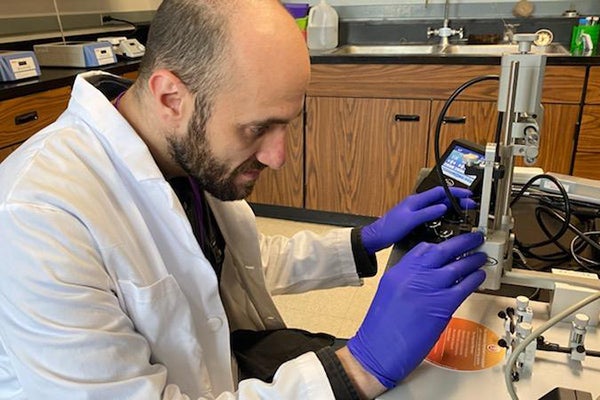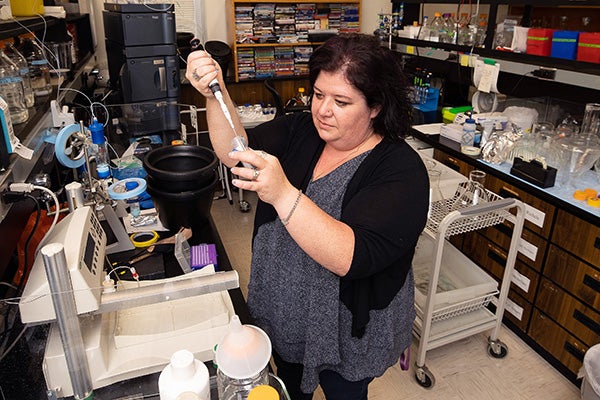Brody School of Medicine researchers advancing brain health knowledge
Two researchers at East Carolina University’s Brody School of Medicine have been selected as the 2022 recipients of the Wooten Family Initiative for Brain Health Research Grant.
Dr. Alessandro Didonna, an assistant professor in the Department of Anatomy and Cell Biology, and Dr. Tonya Zeczycki, an assistant professor in the Department of Biochemistry and Molecular Biology, were selected by the advisory board for the initiative in May.

Two ECU Brody School of Medicine researchers, including assistant professor Dr. Alessandro Didonna, have been selected as the 2022 recipients of the Wooten Family Initiative for Brain Health Research Grant. (Contributed photo)
Didonna was awarded for his research on “Exploring the Role of Centaurin Alpha-1 in Multiple Sclerosis (MS).” Multiple sclerosis is an autoimmune disease of the nervous system characterized by an acute inflammatory phase which is followed by progressive neurodegeneration. He explained that while there is an arsenal of treatments to control the initial inflammatory bursts, the current ability to tackle the neurodegenerative stages of MS is very limited due to limited knowledge of the molecular mechanisms’ underlying disease conversion.
The study will test the novel hypothesis that a protein known as Centaurin A1 regulates the vulnerability of neurons against neuroinflammation, which could have implications for other diseases.
“In particular, Centaurin A1 was previously known to be involved in Alzheimer’s disease, another chronic neurodegenerative disorder,” Didonna said. “We have a good understanding of the molecules and cellular processes governing the autoimmune response in MS. In contrast, the full picture of the physiological mechanisms adopted by the nervous system to cope with neuroinflammation is still missing. This project will help, shedding light on a possible new factor regulating neuronal loss in MS progression.”
Didonna said he can envision two eventual benefits of this research for the clinical management of MS.
“It holds the power to identify a novel therapeutic target to contrast disease progression,” he said. “In particular, it may pave the way to possible innovative neuroprotective therapies aimed at boosting the physiological regulatory systems of the nervous system. Second, understanding the commonalities between MS and Alzheimer’s disease can help translating the existing therapeutic strategies between diseases, possibly expanding the number of arrows in our quiver.”
Zeczycki was awarded for her research on “Preventing the Formation of Toxic Alpha-Synuclein Oligomers: An Alternative Therapeutic Strategy for Slowing the Onset of Parkinson’s Disease.”
“We think that the gut-brain-neuroinflammation link, caused by misbehaving bacterial proteins in the gut interacting with our own proteins, contributes to the onset of Parkinson’s disease. This may be a key player in the onset of other neurogenerative diseases like Alzheimer’s and Alzheimer’s-related dementias, Zeczycki said. “This is one of the directions we aim to focus on during the second year. Gathering some preliminary evidence to show these bacterial proteins and their resulting impact on neuroinflammation may be at the heart of all these neurodegenerative diseases.”

Dr. Tonya Zeczycki works in a lab at the Brody School of Medicine. (Photo by Rhett Butler)
The prevalence of Parkinson’s and other neurodegenerative diseases are continually rising as the baby boomer population ages, Zeczycki added, trends that are apparent in the state and region.
“We are at the infancy of understanding how brain health impacts every other aspect of a person’s well-being, and vice versa, and how other aspects of a person’s well-being (e.g. gut health) impacts their brain health,” Zeczycki said. “From a data gathering perspective, we are at the point where we can no longer look at things in isolation or do our research in ‘silos.’ To really understand brain health research, we need to take in the whole picture from the gene level to the protein level, to the cell and tissue level and then all the way up to the clinics. But it doesn’t stop there. It needs to go back the other way. We need communication with data and results. Having funding for brain health research allows us to build the teams we need to pursue these goals on this scale.”
The Wooten Family Initiative for Brain Health Research, previously known as the Wooten Lab for Alzheimer’s and Neurodegenerative Diseases Research, was established in 2008 by Dr. Harriet Wooten in memory of her husband, Dr. John L. Wooten, an orthopedic surgeon who died of Alzheimer’s disease in 2004. While previous projects focused narrowly on Alzheimer’s, current and future grants will focus on brain health more broadly.
“Initiatives like the ones provided by the Wooten family help the community by affording us the means to do these collaborative research studies with collaborative research teams that have a direct impact on both ECU and its communities,” Zeczycki said. “Graduate students working on getting their Ph.D. and M.S. degrees, medical students on the research distinction tracks, and undergraduates looking for research experience in our labs — many of them who are underrepresented minorities, first generation college students or women — are working side by side with our skilled scientific staff and driving the research forward with us. Through these initiatives, they get to participate in hands-on training in projects that are meaningful and will have an impact on the communities they live in.”
The Wooten family has a long history in Greenville’s health care scene and close ties to the Brody School of Medicine. John L. Wooten’s father, Dr. William Isler Wooten, was the first surgeon in eastern North Carolina and was instrumental in opening Pitt Community Hospital, now ECU Health Medical Center. His son, Lamont Wooten, became an orthopedic surgeon. His grandson, also John Wooten, graduated from Brody and is a medical resident at UNC-Chapel Hill.
Similar to the Brody Brothers Endowment Fund grants, the Wooten grants are meant to provide seed funding for researchers to gather preliminary data and apply for larger grants down the road.
“Research is an adventure, the process is self-perpetuating, and knowledge about brain health is typically acquired in bits and pieces through small discoveries rather than through an epiphany,” said Dr. Russ Price, professor in the Department Biochemistry and Molecular Biology and Internal Medicine. “The Wooten Family Initiative for Brain Health contributes to the general understanding of the underlying causes of neurodegenerative diseases, addresses aging challenges or if we become diagnosed with neurodegenerative diseases and enables faculty to pursue and test new research ideas.”
ECU is in the public phase of the Pursue Gold campaign to raise half a billion dollars. This ambitious effort will create new paths to success for Pirates on campus, across the country and around the world. Donor gifts during the campaign will keep us constantly leading and ready to advance what’s possible. Learn more at pursuegold.ecu.edu.